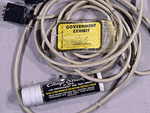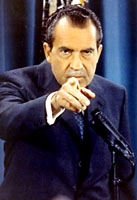Teaser
To indict or not to indict? Watergate raised complicated questions concerning Constitutional interpretation.
Description
Students analyze a primary source document which sets forth points both for and against the indictment of Richard Nixon, before considering Constitutional interpretations of Watergate.
Article Body
The strength of this lesson is that it is centered around a document which presents compelling arguments both for and against the indictment of former President Nixon for his role in the Watergate scandal. The featured document, a memo to the Watergate Special Prosecutor Leon Jaworski, was written by Jaworski's staff as he was considering whether or not to indict Nixon.
The memorandum’s language should be accessible to most high school students. Both a copy of the original document and a transcribed version are available.
The question at the center of the lesson is, "Should the Watergate Special Prosecutor seek an indictment of the former President?" If teachers want to make this lesson more of an historical inquiry, we recommend modifying that question to read: "What were the main arguments for and against the indictment of former President Richard Nixon?"
An additional strength of this lesson is two activities that use the Constitution as a lens to understand the Watergate affair. One of the suggested activities asks students to identify the specific role each branch of government played in the Watergate affair. Another activity asks students to apply specific sections of the Constitution and determine the role particular constitutional powers and rights played in the Watergate affair.
This lesson would likely work best after an introductory lesson on Watergate. While there is no formal assessment included in this lesson, the questions presented by the document easily lend themselves to an essay or a discussion.
Topic
Watergate, the Constitution
Rubric_Content_Accurate_Scholarship
Yes
Historical background is detailed and accurate. The document is from The National Archives.
Rubric_Content_Historical_Background
Rubric_Content_Read_Write
Yes
The lesson is centered around a primary document from the Watergate scandal, and requires students to read the Constitution.
Rubric_Analytical_Construct_Interpretations
Yes
Students are asked to weigh the reasons for and against indicting Nixon.
Rubric_Analytical_Close_Reading_Sourcing
Rubric_Scaffolding_Appropriate
Yes
The main document is appropriate and accessible for most high school students, as are the teaching activities.
Rubric_Scaffolding_Supports_Historical_Thinking
Yes
The lesson includes the Archives' worksheet for analyzing primary source documents, asking students to consider source and contextual information when interpreting the document.
Rubric_Structure_Assessment
Rubric_Structure_Realistic
Rubric_Structure_Learning_Goals
Yes
Appropriate for one class period.



